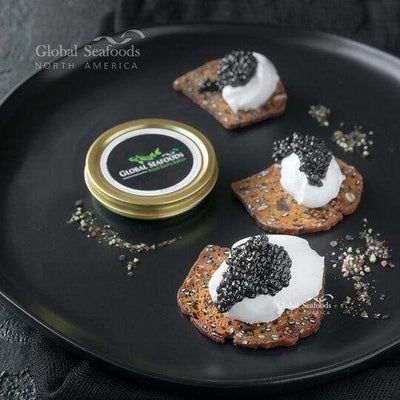Beluga Caviar: Luxurious Taste, Health Benefits, and Sustainability

Beluga Caviar: Luxury, Benefits, and Sustainability
What Is Beluga Caviar?
Beluga caviar, derived from the roe of the beluga sturgeon (Huso huso), is the pinnacle of luxury in the culinary world. Renowned for its large, delicate pearls and buttery, nutty flavor, this caviar is sourced primarily from sturgeons found in the Caspian Sea, Black Sea, and occasionally in freshwater rivers.
This prized delicacy stands out due to its rarity, rich taste, and the sophisticated experience it offers. As one of the most sought-after varieties, beluga caviar is often a highlight at upscale dining events, weddings, and special celebrations.
The Distinct Taste of Beluga Caviar
Beluga caviar is celebrated for its unparalleled flavor profile.
- Buttery Notes: Its creamy texture melts in your mouth, offering a rich, buttery sensation.
- Nutty Undertones: A subtle nutty flavor balances the brininess.
- Delicate Brine: The light saltiness enhances its complexity without overpowering its natural essence.
These characteristics make it an exceptional choice for pairing with refined accompaniments like blinis, crème fraîche, or toasted brioche.
Nutritional Benefits of Beluga Caviar
Beluga caviar isn’t just about indulgence—it’s also a nutrient-packed superfood.
Omega-3 Fatty Acids
Rich in omega-3s, beluga caviar supports heart health by reducing inflammation, lowering cholesterol levels, and improving blood circulation.
High in Protein
Each serving of beluga caviar is a significant source of protein, essential for muscle repair, energy production, and overall vitality.
Packed with Vitamins and Minerals
- Vitamin B12: Essential for red blood cell production and brain health.
- Vitamin D: Supports bone health and immune function.
- Iron: Boosts energy and prevents anemia.
- Selenium: Acts as an antioxidant, protecting cells from damage.
Anti-Aging Properties
The nutrients in beluga caviar, particularly omega-3s and selenium, help maintain skin elasticity, reduce wrinkles, and promote a youthful glow.
Sustainable Farming Practices for Beluga Caviar
With wild sturgeon populations under threat, sustainable farming is vital for preserving this species and maintaining a steady supply of high-quality caviar.
Captive Breeding
Modern farms focus on breeding sturgeon in controlled environments to reduce the strain on wild populations. These programs are essential for conservation and ensure a continuous supply of beluga caviar.
Water Recycling and Waste Management
Innovative farms use advanced filtration systems to recycle water and treat waste, minimizing environmental impact.
Ethical Harvesting Practices
Sustainable farms prioritize ethical harvesting techniques that ensure the welfare of the fish and the quality of the roe.
Certification and Regulation
Leading farms adhere to strict guidelines from organizations like CITES (Convention on International Trade in Endangered Species) to guarantee the legal and ethical sourcing of caviar.
How to Enjoy Beluga Caviar
Serving Suggestions
- Temperature: Serve chilled, between 28°F and 32°F (-2°C to 0°C).
- Presentation: Use a non-metallic spoon (mother-of-pearl or glass) to preserve the taste. Serve on ice in a crystal dish for an elegant presentation.
Pairings
- Champagne: The crisp acidity and effervescence of a dry Champagne complement the creamy texture of beluga caviar.
- Vodka: A classic pairing, vodka’s clean taste enhances the caviar’s briny notes.
- White Wine: A light, unoaked Chardonnay or Sauvignon Blanc is a perfect choice.
Pairing Ideas and Recipes
- Caviar on Blinis: Spread crème fraîche on a mini pancake, top with a spoonful of beluga caviar, and garnish with chives.
- Caviar Deviled Eggs: Add caviar atop classic deviled eggs for a luxurious twist.
- Caviar Pasta: Mix beluga caviar into a light cream sauce with al dente pasta for a decadent meal.
FAQs: Everything About Beluga Caviar
1. Why is beluga caviar so expensive?
Beluga sturgeons take up to 20 years to mature, making their roe rare and costly. Sustainable farming and ethical harvesting also contribute to the price.
2. How do I store beluga caviar?
Store unopened caviar in the coldest part of your fridge (28°F–32°F). Once opened, consume it within 2–3 days for optimal freshness.
3. Can I freeze beluga caviar?
Freezing is not recommended, as it can alter the texture and flavor.
4. How can I identify high-quality beluga caviar?
Look for large, intact pearls with a glossy appearance. The taste should be creamy and not overly salty. Reputable sellers provide certifications for authenticity.
Why Choose Sustainable Beluga Caviar?
By supporting sustainable caviar farms, consumers help protect wild sturgeon populations, reduce environmental harm, and ensure the availability of this delicacy for future generations. Ethical sourcing also guarantees superior quality and traceability, giving buyers confidence in their purchase.
Where to Buy Premium Beluga Caviar
Indulge in the world’s finest beluga caviar from trusted suppliers:
For a broader selection, explore:
Final Thoughts
Beluga caviar represents the epitome of luxury, combining exquisite taste, nutritional benefits, and a commitment to sustainability. Whether enjoyed at a celebratory event or as a personal indulgence, this delicacy offers a sensory experience like no other.
Support sustainable caviar farming and savor the elegance of beluga caviar while contributing to the conservation of our oceans and sturgeon populations.
For tips, recipes, and insights, subscribe to our YouTube Channel.
Also in News

How to Make Sea Bream Sushi With Dry-Aged Tuna & Crab Roll — Step-by-Step With Chef Joshua
A complete guide to making Sea Bream sushi at home, including filleting, curing, slicing, and building a Dry-Aged Tuna & Crab sushi roll. Chef Joshua shares professional tips for restaurant-quality results.

Boiled Crab for Game Night: Everything You Need for a Perfect Seafood Party
Take your game night to the next level with a Boiled crab party. Learn the best recipes, cooking tips, and hosting hacks for a memorable seafood feast.

Boiled Crab for Date Night: A Romantic Guide to the Perfect Seafood Feast
Make your next date night unforgettable with a romantic Boiled crab experience. This guide covers everything you need to know, from ambiance to the best crab varieties.

